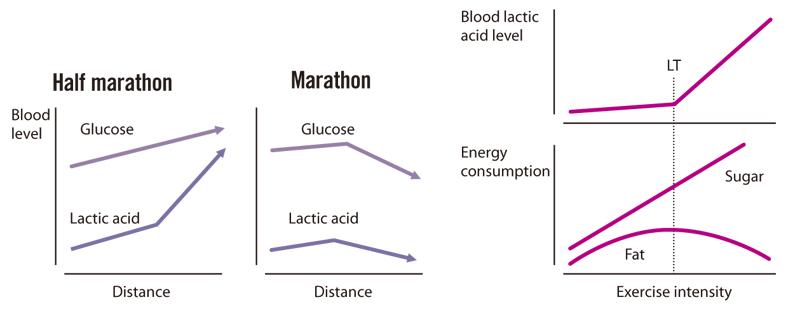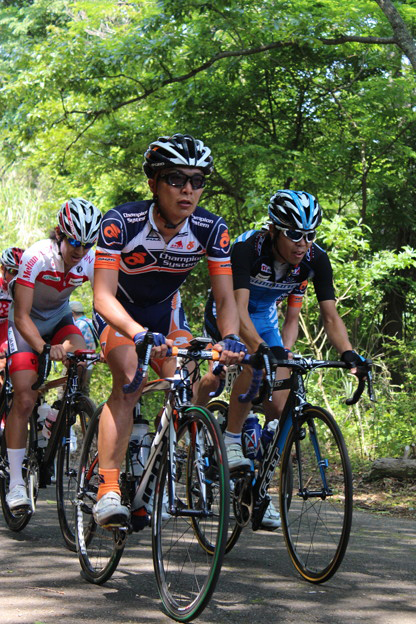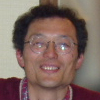Sports Research at the University of Tokyo
It is not just athletes who are seriously into sports at the University of Tokyo. In this section we introduce some of the "powerful Socrates" at the University, faculty members who are daily engaged in research and education relating to sports. Several sports researchers from among the many at the University of Tokyo describe the most interesting themes in sports research today.
Lactate
Lactate is not the cause of exhaustion

Fig. 1: In a half marathon, athletes still have relatively large amounts of carbohydrates in their blood, so the blood levels of lactate and glucose increase as the athletes exert themselves to reach the goal. In a full marathon, however, the body depletes its carbohydrate reserves, and the blood levels of lactate and glucose drop.
Fig. 2: Lactate threshold (LT) is the exercise intensity at which carbohydrate production increases, boosting the blood level of lactate.Both figures are from Nyusan wo tsukaikonasu ranningu (“Running that Makes Full Use of Lactate”) Hideo Hatta, Taishukan Publishing.
So is lactate a waste product and a factor that causes exhaustion?
Traditionally, lactate has been considered a waste product that causes fatigue. When athletes say that their muscles are “pumped with lactate,” what they mean is that they are exhausted. The two expressions have become synonymous. But if lactate bacteria are believed to be good for the body, why is lactate considered bad? My research aims to clarify the mechanisms of energy generation during physical exercise and the true nature of exhaustion, placing the focus on lactate and its functions in the human body. The main energy sources in all living organisms are carbohydrate (glucose) and fat. Simply put, carbohydrates are converted into energy more easily than fat. Therefore, they are used as a primary energy source during physical exercise. Carbohydrates, however, have one distinctive characteristic: their reserve in the human body is limited. Lactate is a byproduct in the process of metabolizing carbohydrates for energy, and as such it is not a waste product, but rather an extremely easy-to-use energy source.
It was believed that physical exercise fell into two general categories: aerobic and anaerobic. Anaerobic metabolism usually comprises strength-based activities, and as such traditionally has been associated with the production of lactate. But is it possible for the body to become fully anaerobic during physical exercise? Physical activity in the complete absence of oxygen is impossible. Lactate is produced not because the body is in an anaerobic condition, but because it is using large amounts of carbohydrates.

Fig. 3: “We were probably the first university team that fully adopted the concept of conducting rigorous measurements of the exercise intensity at which lactate production increases abruptly, and establishing that intensity as the cornerstone of our training plan. As a result, our training efficiency increased dramatically.” (Ryota Nishizono, professional racing cyclist)
In marathon racing and football, exhaustion is linked with the decline of lactate
The limited reserve of carbohydrates in the human body is closely related to the drop in speed athletes suffer in the second half of a full marathon, when they hit the wall at 30 km. As the volume of carbohydrates, which are the primary energy source for muscles, decline, it becomes more difficult for them to exert force. And since lactate is a byproduct of metabolizing carbohydrates, as carbohydrate levels drop, lactate cannot be produced. In a full marathon, athletes experience the most severe exhaustion during the last stage of the race. This exhaustion occurs in a condition in which lactate cannot be produced (Fig. 1). Although not to the same extent as in marathon racing, in football and other sports, too, athletes suffer exhaustion in the second half of the competition, when the amount of lactate produced declines. This phenomenon shows that the accumulation of lactate is not the cause of exhaustion during prolonged physical exercise. Reduced levels of carbohydrate have a high bearing on exhaustion during exercise, but they are just one of the factors that cause exhaustion. Exhaustion cannot be explained with a single cause such as the accumulation of lactate.
Lactate as an indicator of physical condition
So if lactate is not the cause of exhaustion, is it pointless to measure blood levels of lactate in athletes? If we could obtain an insight about the conditions inside the muscles, we would be able to understand the nature of exhaustion during exercise. It is quite difficult, however, to know what is going on inside the muscles. Lactate is produced in the muscles and released into the blood, so by measuring the blood level of lactate it will become possible to learn, albeit indirectly, about the conditions inside the muscles. In particular, it is possible to determine the pace for long-distance running by examining the way the blood levels of lactate change depending on exercise intensity (Fig. 2). For instance, we have helped members of the University of Tokyo Bicycle Racing Team to improve their performance by conducting lactate blood level tests, power measurements, and rigorous analysis of results.
Sports activities of the University of Tokyo students
Speaking about the athletes among University of Tokyo students from the position of head of the Track & Field Club, I believe that, with a view of their outstanding intellectual abilities, studying sports science will further boost their sports activities. Persistence is another characteristic for which our students are known. Take for instance Ken Akashi, the famous race walker and alumnus of the University of Tokyo Track & Field Club who competed in the World Championships in Athletics, or Ryota Nishizono of the University of Tokyo Bicycle Racing Team (Fig. 3). It is necessary to remember, however, that lack of sufficient practice during the high school years means that one must spend a great deal of time training in a thorough manner, without expecting easy results.





